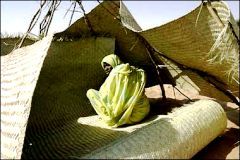Peace treaty ends Sudan’s civil war, but conflict in Darfur rages on
BY SUDARSAN RAGHAVAN, Knight Ridder Newspapers
NAIROBI, Kenya, Jan 9, 2005 (KRT) — Sudan’s government and southern rebels clinched a historic, long-awaited agreement Sunday that ends Africa’s longest civil war and brings hope to millions of exiled Sudanese yearning to return home.

|
|
A Sudanese woman refugee arriving from Labado protects herself from the wind at Kalma Camp, near Nyala in Sudan’s South Darfur region 09 January 2005. (AFP). |
But continued violence in the troubled region of Darfur, previously described by the Bush administration as genocide, cast a shadow over Sunday’s agreement, which does not cover the Darfur conflict.
As men in leopard-skin loin clothes danced and women in yellow-frilled skirts sang, Sudan’s first Vice President Ali Osman Mohammed Taha and John Garang, the leader of the Sudan People’s Liberation Movement, signed the pact in the Kenyan capital of Nairobi.
Secretary of State Colin Powell, along with eight African heads of state and hundreds of ordinary Sudanese, witnessed the ceremony in the city’s main sports stadium, which closed one of the continent’s darkest chapters.
The 21-year-old conflict in the south killed an estimated 2 million, mainly through war-induced hunger and disease, and displaced 4.5 million, reducing Africa’s largest country to one dependent on international aid.
“This is a promising day for the people of Sudan, but only if today’s promises are kept,” said Powell, who signed the accord as a witness.
The war in Darfur has taken an estimated 70,000 lives, uprooted 1.6 million and shows no signs of fading despite cease-fires and threats of international sanctions.
In a 16-page report on Friday, U.N. Secretary-General Kofi Annan said conditions in Darfur were deteriorating. He charged the Sudanese government of doing nothing to disarm and prosecute Arab militias called the Janjaweed who have committed some of the worst abuses in Darfur. The instability, analysts say, could undermine Sunday’s accord.
“Implementing this deal is difficult under any circumstances, and with an active civil war it will be even more difficult,” said David Mozersky, a Sudan analyst with the International Crisis Group, a Brussels-based think tank.
U.S. officials have said that Sunday’s agreement could serve as a model to end Darfur’s conflict. Powell urged all sides to move toward resolving the conflict, saying that a solid U.S.-Sudan relationship hinges on peace throughout Sudan.
“These new `partners for peace’ must work together immediately to end the violence and the atrocities that continue to occur in Darfur,” Powell said. “Not next month or in the interim period but right away, starting today.”
The war in the south pitted the Arab and Muslim north that ran the nation against Christian and animist rebels in the south. The fighting began in 1983 over political autonomy for the south, but evolved into a complex war over religion, oil and politics.
Peace talks began in early 2002 following a combination of heavy international pressure, especially from Washington, war fatigue and a realization that Sudan’s oil wealth could be better tapped during peace. Sudan’s government wants U.S. sanctions – imposed on Sudan for supporting terrorism – to be lifted.
The Bush administration wants to prevent Sudan, which once harbored and evicted terrorist mastermind Osama bin Laden in the 1990s, to again become a base for global terrorists. Both African-American leaders and core Christian right voters pressured the administration to take action against Sudan’s Islamic and Arab regime, which they say oppresses Christians and condones slavery.
Sunday’s power-sharing treaty grants the south autonomy for six years, after which southerners will vote to decide if they want to remain a part of Sudan or become independent. Oil revenues will also be split evenly between south and north.
The accord also allows for more religious freedom, with the south becoming secular and the north practicing Islamic law. U.N. observers will monitor the cease-fire and demobilization of armies.
Huge challenges remain. The rebels have to create a political apparatus, then build a government in the south from scratch. Hardliners within the regime still oppose the accord, which largely benefits the rebels.
Militia leaders aligned with the government pose a threat to the peace process, and demobilization could prove difficult. And hundreds of millions in international aid is needed to rebuild the war-shattered south and lure educated Sudanese exiles back.
For the hundreds of Sudanese who gathered on Sunday, the signing of the peace accord brought hope they hadn’t felt in years. Many were children when they fled their homeland.
“We have peace now. War won’t happen again,” gushed Peter Chat, 22, who spent the past 15 years in a crowded refugee camp in northern Kenya. “We pray to God to keep this peace so we can become one people again.”
In his hands he carried a green placard that read: “When shall I reach my Motherland?”
Monica Charles, 30, a tall southerner, wondered if the peace she came to celebrate will take root.
“Peace with the Arabs is a big problem,” she said. “We have seen a lot of agreements and not anything good. This time, I hope we see something good because too many of our people have died.”
